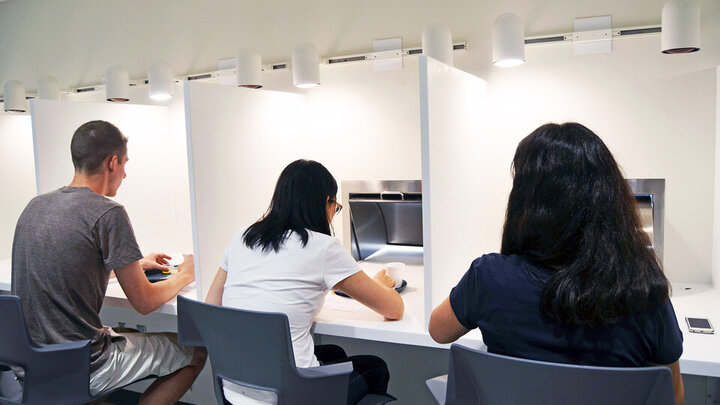Sensory lab offers variety of testing to suit client needs

If you’ve ever tried a company’s new low-sodium or gluten-free product, you may have enjoyed the fruits of a sensory analysis test run at the University of Nebraska–Lincoln.
The Sensory Analysis Lab, housed within the Food Processing Center on Nebraska Innovation Campus, fills a niche need for low-cost, high-value insights for food product developers and companies. The sensory lab offers companies consumer insights about new products and those that undergo ingredient substitutions. This unique offering helps food companies determine whether their products are ready for market, among many other things.
“We’re a good resource for those smaller to medium-sized companies that are wanting quick and fairly inexpensive feedback,” said Julie Reiling, manager of the sensory lab.
Typical sensory lab clients are growing companies that are expanding their offerings or ingredient companies looking to differentiate their product from competitors. The sensory lab provides timely, inexpensive feedback from panelists using a variety of test options.
“We had one well-known Nebraska company that had an ingredient in their product that contained wheat gluten and they wanted to remove that so that they could advertise it as being gluten-free,” Reiling said. “They didn’t want it to affect the flavor because it’s a very popular product, and people would be upset if it tasted different. So, they made the substitution and then we ran sensory panels here to see if people could tell the difference. We found that they could not, so they were able to make that substitution, and nobody would be the wiser other than now they can claim gluten free.”
In another case, a Texas company that made refrigerated microwave meals was in search of general consumer feedback. Panelists were given portions of the company’s meals and rated things such as flavor balance and appearance. The panelists rated the meals on a Hedonic scale, which is a nine-point scale ranging from dislike extremely (1) to like extremely (9). The typical response for a meal was an 8 (like very much), indicating to the company that the product was ready for market.
When clients come to the sensory lab, they give the lab a sample of their product and the lab gathers panelists — usually university affiliates who have signed up to participate — and prepares rating forms for the company-selected test.
The lab offers in-depth analysis, informal feedback and a range of consumer test options tailored to a company’s needs. These include Hedonic scales, attribute rating scales and triangle testing.
During testing using Hedonic scales, panelists may be asked about aroma, appearance, flavor and aftertaste. By specifying different areas of the product, companies can troubleshoot more specific issues with their product.
Attribute rating scales go more in-depth, digging into attributes that the companies want to know more about. Panelists are asked several questions about texture, flavor and more. They then rate the attributes on a 15-point scale that has opposite attribute indicators. For example, a question about saltiness would have ends marked from “lacking” or “intense.”
The attribute rating scales are best used as a product development tool, when companies are trying to fine-tune their product. Hedonic testing is better suited toward determining if a product is ready for consumption.
A triangle test is “where we present panelists with three samples all at the same time. Two are the same and one is different, and we ask them to try to pick the one that’s different,” Reiling said. “This test is something that would be very valuable in an ingredient substitution where you’re hoping that the product tastes the same after switching an ingredient.”
In some cases, a combination of tests can be tailored to best suit a company’s needs.
“We had a sports drink company that wanted to update their formula and replace artificial sweeteners with a more natural sweetener,” Reiling said. “They wanted to get people’s preference, but they also wanted to collect a little more information. For the first test, panelists got one sample at a time and rated it on a Hedonic scale. After that, they got both samples at the same time and were asked to pick which of those they preferred. That’s just one example of how we would mix tests together to try to get more information.”
The sensory lab has flexible options that cater to a client’s needs, providing a range of general and precise services at a fraction of the cost of bigger facilities. Other unique services are available to Nebraska Innovation Campus partners.
Partnerships range from an occasional drop-in desk to a rented office at Nebraska Innovation Campus, and companies benefit through discounted services and instant collaboration with the team. Current partners include a beef company, two pet food companies, a natural ingredient company, a creamery and two companies developing Aronia berry products. These companies have employees stationed on the Nebraska Innovation Campus.
Through all of these partnerships, collaboration and testing, the Sensory Analysis Lab provides companies with high-value insights to produce high-quality products.
